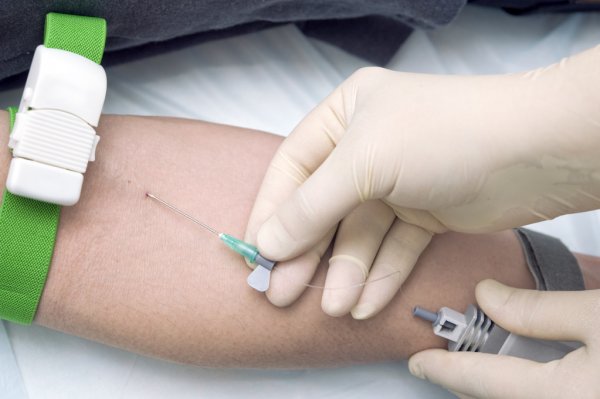Warning: It is important that you tell your doctor if you have or have had any problems with your liver before using Adriamycin. Because there is more than one type of this medication, it is important that you never switch without first consulting your doctor to make sure that the switch will not cause negative effects for you. It is important that this medication be administered below the skin, ideally into a muscle, so make sure that you have been shown how to use the IV version of this medication properly to avoid possible damage to skin, tissue, and muscle.

Indications: Adriamycin is a medication used commonly in chemotherapy, and it is often used in conjunction with other types of cancer medication to help slow or stop the growth of active cancer cells in various parts of the body.
Adriamycin is used to treat a variety of cancers, mainly:
- cervical cancer
- endometrial cancer
- head and neck cancers
- Prostate cancer
- liver cancer
- ovarian cancer
- gestational trophoblastic tumor (a rare form of cancer in women that rises in the uterus or womb)
- carcinoid tumors (rare tumor that tend to arise in the gastrointestinal tract and in the lungs)
- non-small cell lung cancer
- multiple myeloma (a form of blood cancer)
- Pancreatic cancer(Cancer of the pancreas)
- esophageal cancer (Cancer of the esophagus)
- retinoblastoma (a common intraocular cancer of childhood)
- hepatoblastoma (a certain type of liver cancer that occurs in children)
- cancer of the thymus (a small organ in your upper chest, under your breastbone)
- cancer of the adrenal cortex (the outside layer of the adrenal gland)
- chronic lymphocytic leukemia (a type of cancer of the blood and lymph system)
- Ewing’s sarcoma (a type of cancer occurs in the bone or close to the bone, most often in adolescents)
- Autoimmune deficiency syndrome (AIDS)–associated Kaposi’s sarcoma (a type of cancer of the skin and mucous membranes that is more common in patients with AIDS).
Dosage: Adriamycin is injected into a vein by a medical professional when it is part of your cancer treatment process. Because this medication is part of a larger chemotherapy process, the dosage will be different depending on the type of cancer you have, your age, your weight, and your previous responses to various medications or treatments. It is important that you work closely with your doctor while taking this medication to keep your dosage levels accurate. It is important that caregivers avoid contact with the urine, sweat, blood, and other bodily fluids for at least five days after treatment.
Overdose: Overdose enhances the toxic effects of Adriamycin. Very high doses of Adriamycin can cause heart problems and severe aplastic anemia (bone marrow does not produce enough new cells) in the space of 10 to 14 days. In fact, heart failure can occur even 6 months after an overdose. If you experience abnormal effects during and after the treatment, report them immediately to your doctor. Treatment of Adriamycin overdose includes supportive measures and possibly blood transfusions. You can also be recommended to stay in hospital for days.
Contraindications: There are several contraindications to consider when using this medication, and the easiest way to make sure that you remain in good health while taking Adriamycin is to work closely with your doctor throughout the process. Some common contraindications include: previous use of anthacycline drugs, allergies to inactive ingredients within this medication, and young age. In most cases, your doctor can help find a way to make this medication work with your lifestyle and other medications you may be on. Please consult with your medical doctor to make sure that you are using this medication properly.
Interactions: Like most medications, different interactions with other drugs can change the way that this cancer treatment medication acts in your body. Risks of serious side effects may increase if this drug is used with other medications. Some known medications that cause negative side effects with Adriamycin include calcium channel blockers, phenobarbital, progesterone, zidovudine, stavudine, digoxin, and streptozocin. This list is by no means complete, so make sure that your doctor knows about any and all medications you might be taking during the course of your cancer treatment. It is also important to avoid eating food that may contain turmeric since this spice is known to lessen the positive effects of this medication. This medication can
Side effects: Adriamycin attacks not only cancer cells but healthy cells; this often leads to the development of adverse effects in most patients. Most common Adriamycin side effects include: fatigue; nausea and vomiting; mouth sores; hair loss; abdominal pain; difficulty swallowing; eye watering; nail discoloration; s kin discoloration/irritation; swelling, pain, redness, or peeling of skin on the palms and soles of the feet; and low blood counts: low red blood cell count, low white blood cell count, low blood platelet count.
Although rare, it can happen that Adriamycin triggers secondary leukemia and severe heart problems.
Heart problems: Adriamycin can damage the heart muscle and lead to:
- chest pain and tightness
- abnormal heart rhythm
- Sudden reddening of the face, neck, or upper chest.
If you experience these symptoms, see your doctor immediately. Cardiac and haematological (blood and blood-producing organs) monitoring is necessary during the treatment. In some cases, your doctor can conduct a complete blood count and electrocardiogram before each injection. Surveillance should be increased in cases of liver problem and radiotherapy.
In the majority of women, Adriamycin may cause temporary absence of menstruation (amenorrhea). For women approaching menopause, Adriamycin may cause complete absence of menstruation. The drug may also lead to discoloration of urine and formation of blood clot within a vein (venous thrombosis).



